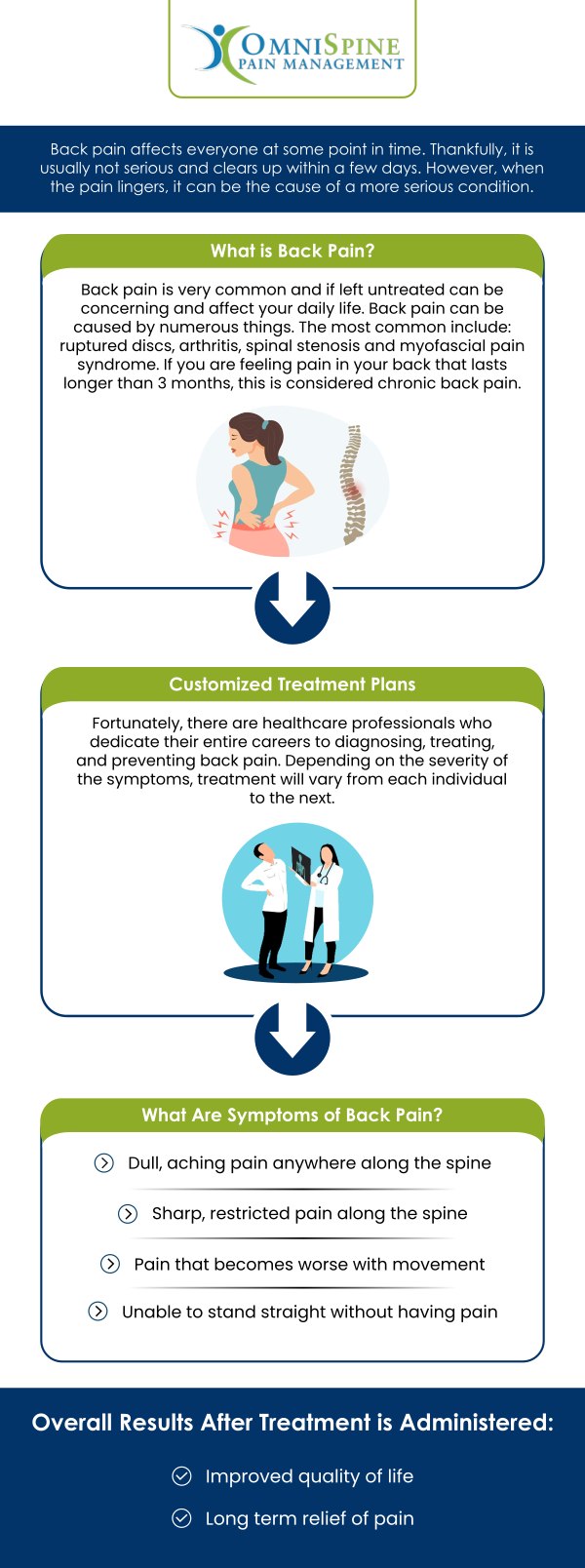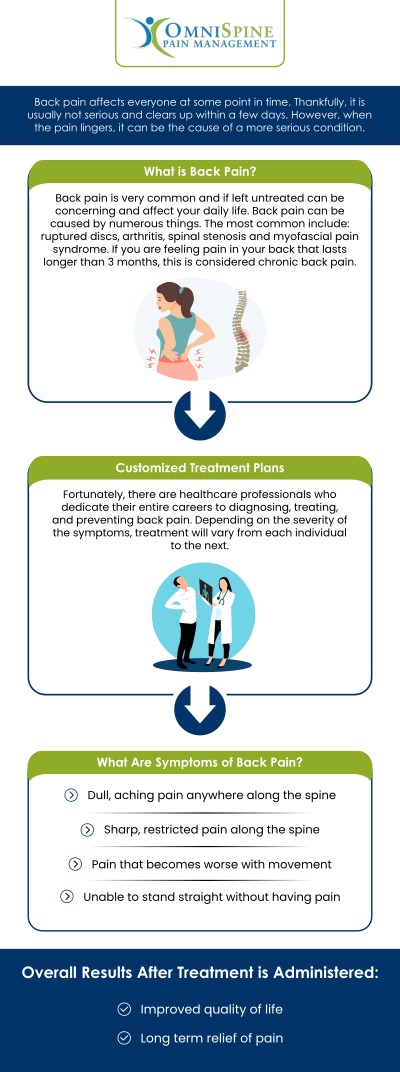Back Pain Doctor in Sunnyvale, TX
When it comes to back pain, people should never be reluctant to seek professional care because even the most innocuous minor symptoms may signal more serious health issues. Treatment is necessary if back pain does not go away on its own or gets to the point where it interferes with an individual’s ability to go about their everyday life. Ashley A. Joseph, M.D. offers treatment for back pain at OmniSpine Pain Management. For more information, Contact us today or book an appointment online. We are conveniently located at 270 S Collins Rd, #200 Sunnyvale, TX 75182.




Table of Contents:
How to relieve back pain?
What are the 3 common causes of back pain?
How do I know if my back pain is muscle or organ?
What symptoms associated with back pain should prompt you to see a doctor?
Relieving back pain often requires a multifaceted approach to comprehensively address the symptoms and the underlying causes of discomfort. Pain specialists, such as those at OmniSpine Pain Management, work with patients to develop a comprehensive treatment plan tailored to back pain’s specific causes and symptoms.
This may involve a wide range of interventional and regenerative treatments along with therapies and adjustments. A variety of non-invasive and surgical treatment options will be considered according to patient needs.
Lifestyle modifications also play a crucial role in managing back pain. This includes maintaining a healthy weight, practicing proper posture, and incorporating regular, low-impact exercise into one’s routine to support spinal health. Adjustments at work and home can reduce the risk of back strain and improve comfort during daily activities. For those seeking immediate relief, over-the-counter pain medications, heat therapy, or cold packs can provide temporary respite from acute back pain.
Back pain can arise from a variety of sources, with three common causes being degenerative conditions, injuries, and health and lifestyle factors.
Degenerative conditions such as osteoarthritis and degenerative disc disease occur as a result of wear and tear on the spine over time, leading to pain and stiffness. These conditions are more prevalent in older adults but can be managed with appropriate medical care and lifestyle adjustments.
Acute injuries, including sprains and fractures, can result from accidents, falls, or improper lifting techniques, causing immediate back pain and requiring prompt treatment to prevent chronic pain development.
Lifestyle factors also significantly contribute to back pain, with poor posture, obesity, and lack of physical activity all being key contributors. Poor posture can strain spinal muscles and ligaments, whereas excess weight places additional pressure on the spine, increasing the risk of pain. A sedentary lifestyle, particularly with prolonged sitting, can weaken back muscles and lead to pain over time.
Addressing these lifestyle factors through improvements, weight management, and regular physical activity is essential for preventing and alleviating back pain. Individuals must be careful not to overtrain or overexert themselves when implementing such adjustments as this can also lead to back pain.
To that end, specialists at OmniSpine Pain Management can provide patients with guidance on suitable lifestyle adjustments.
It can be difficult for individuals to distinguish muscle back pain from organ pain as they may present with similar symptoms. The only way for individuals to know is to consult pain specialists for a diagnosis.
Typically, muscle pain is characterized by sharp and specific feelings of pain while organ pain is more generalized. Muscular pain is often exacerbated by movement and results from strain or overuse. Pain originating from internal organs may present as a dull, aching discomfort that may or may not be affected by movement or posture.
This pain might be accompanied by other symptoms that can be indicative of serious health concerns. Healthcare providers can perform a thorough assessment, including a physical examination and diagnostic tests, to distinguish between muscular pain and pain related to organ dysfunction. Identifying the correct source of back pain will help dictate a tailored treatment plan for each individual.
While many instances of back pain can be effectively managed with home care and self-treatment, certain symptoms associated with back pain will require medical attention. These include severe pain that does not improve with rest, pain that radiates down the legs, especially if it extends below the knee, and back pain accompanied by weakness, numbness, or tingling in the legs.
Additionally, back pain following a traumatic event should be evaluated by a healthcare professional to rule out fractures or other serious injuries. When back pain does not resolve on its own or reaches the point where it is interfering with an individual’s daily functioning treatment is imperative.
Unexplained weight loss, fever, or changes in bowel or bladder control could indicate a more serious underlying condition requiring immediate intervention.
Individuals should not hesitate to seek specialized care for their back pain, as even seemingly minor symptoms can indicate serious health concerns.
Back pain treatment is available at OmniSpine Pain Management. For more information, Contact us today or book an appointment online. We are conveniently located at 270 S Collins Rd, #200 Sunnyvale, TX 75182. We serve patients from Sunnyvale, TX, Rockwall, TX, Garland, TX, Rowlett, TX, Kaufman, TX, Forney, TX, Heath, TX, and surrounding areas.
Check Out Our 5 Star Reviews






